A New Legacy
Story by Chris Francis
The Tammens have farmed their family’s land for over 100 years. Now two generations of IWU grads are turning the farm into a craft brewery — and a new legacy.
Among the most prized possessions of Morris Tammen’s ’75 youth was his classic leather-seated Norton motorcycle. It was the kind of machine he used to make mischief in his hometown of Thawville, Illinois, which is just what he had in mind when riding that motorcycle through the Illinois Wesleyan campus with two other Tau Kappa Epsilon members in tow wearing nothing but cowboy boots and masks — in Morris’s case, an oversized devil mask. That’s when he drove past his future wife, Linda (Brown) Tammen ’76.
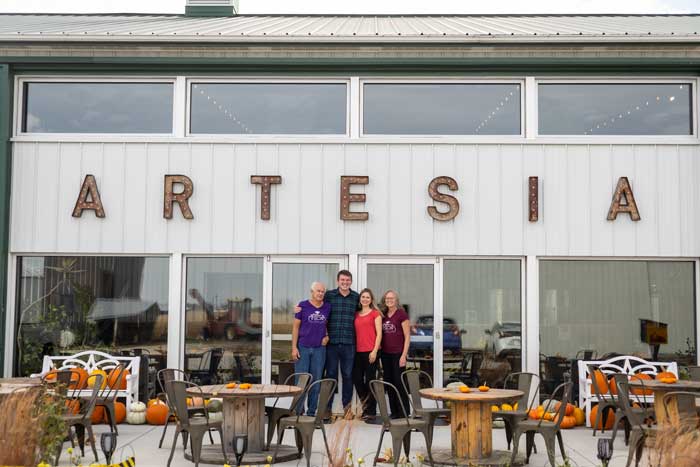
Moments later, at an unfortunately timed stop, the bike stalled, a security officer shouted at the young men and Morris’s TKE brothers bailed. With several desperate kicks, Morris revved the engine back up for a last-second escape as Linda and other bystanders laughed and hollered after him.
That story became the inspiration for the signature beer at the Tammen’s new family business, Artesia Brewing, in their generational hometown of Thawville. The Streaker is “an eminently sessionable Belgian-Style Single brewed with spices and citrus,” as the website describes, brewed by their Illinois Wesleyan alumni children Evan Tammen ’09 and Katrina (Tammen) Reber ’05 and their children’s spouses (with a little age-appropriate help from the grandkids).
Together, the Tammen family runs Artesia as if it has been in the family for generations. For the parents, the brewery is a continuation of the farm that has been under the care of the Tammen family for over 100 years as they enter retirement. For the children, it’s an opportunity to realize a hobby as a profession and carry on the legacy of the family’s land. For them all, it’s a chance to remake an idyllic life in rural Illinois for the newest generation of Tammens.
· · ·
Artesia Brewing is a short drive off a long country road, sitting in the middle of a plot of farmland that has been in Morris’s family ever since his ancestors were invited to work there at the end of the 19th century. The Lisks, a farming family who previously owned the land, were reliable sponsors of immigrants from Scandinavia looking for a new life in the American Midwest. Two of these immigrants were Andrew Olsen and Katrina Thompsen, Morris’s great-grandparents, who worked on the farm together, married and bought the land from the Lisks themselves.
Each generation since has added parcels to the land. Morris’s grandparents dug an artesian well on the property. Morris’s parents bought a neighbor’s farmhouse in which to raise their kids. And when it came time for Morris to decide what path he would take after finishing his schooling, his own dad offered his take with the family’s understated humor and love. “You know, farming is not that bad.”
Morris had joined the Illinois Wesleyan class of ’75, and when he had only a few weeks of college left before returning to the family farm, he decided he might as well find someone to take out on a date. He browsed Linda in the yearbook and gave her a call, but Linda knew of him by reputation.
Morris had plenty of rambunctious childhood adventures. He was known as a playful mischief maker in Thawville, as well as a crack shot with a gun and bow culling the birds infesting farms. And his ability to get up to anything he could with his TKE brothers was an item of gossip on campus. Even now, Morris’s family finds themselves having to cut off his persistent reminiscing from his youth before he can reveal too much. So, when Linda found herself talking to him on the phone, she was quick to turn down the date but happy to let him know that she and a friend of hers had named a dog after him. Not theirs, but a sheepdog that played in a yard near campus that they liked to visit. The name seemed appropriate given their shared personalities.
Charmed and encouraged by his namesake, Morris tried again with only five days left before graduation, when Linda figured that she might as well go ahead with a date given she would never see him again after he left college.
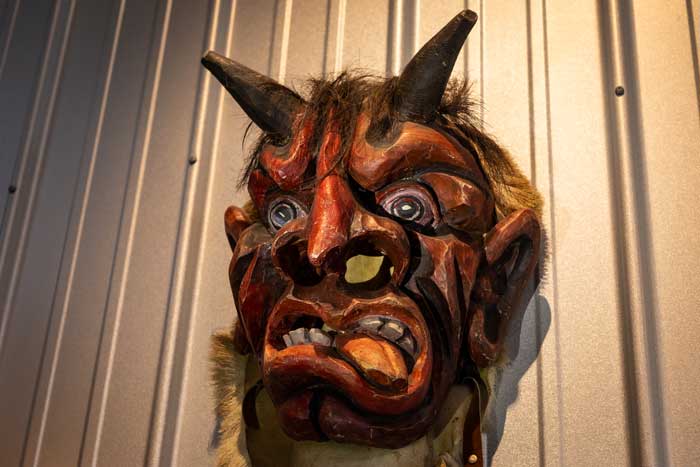
They went on five dates in five nights, the third of which was to his family farm where Linda met his parents for the first time. But the acceleration of their courtship wasn’t a problem for Linda. She had grown up on a farm outside of Galesburg, Illinois, and even though Morris had at first thought she was a “cool hippie girl,” Linda knew she would want to go back to life on a farm.
“My siblings and I have remarked on how we owe our existence to a sheepdog,” said Katrina. Indeed, sister Alison was born as their eldest, followed by Katrina and Evan, after Morris and Linda married in 1977.
A year into their marriage, Linda happened to find the infamous devil mask that Morris had worn on his bike ride, discovering that he had been the masked motorcycle streaker all along.
· · ·
The Tammen kids also owe their existence to Illinois Wesleyan drawing Morris and Linda to the same school. Linda and her two siblings were all in college at the same time, and, with each of them paying their own way through college, they decided where to go based on who offered the best financial incentive.
Linda wouldn’t have been able to study elementary education at IWU without the advocacy of the recently passed Lynn Nichelson (see obituary on page 36), the original director of the Office of Financial Aid, whose aid package made Illinois Wesleyan Linda’s best choice.
“I remember going to his office once, crying, and he told me that ‘we’re going to work this out,’” Linda said. “Just a wonderful guy.”
Morris came to Illinois Wesleyan to study economics, which sent him abroad twice with Professor Campbell Evans to survey businesses and industries in Western Europe. And while he wasn’t tearing through campus on his Norton, Morris broke records in the long jump and triple jump under coach Bob Keck.
But both most appreciate what they learned through studying the humanities as general education requirements at Illinois Wesleyan. “It taught us how to live, and how you make your life with each complex choice you have to consider,” Linda says.
When it came to the kids, the most natural fit was in music. Musical talent and interest had always been in the family with Morris’s mother being a church organist for more than 50 years, and, although Morris didn’t play an instrument, “I provided music for the house with a great record collection,” he said. The kids were themselves members of a youth orchestra in Champaign, Illinois, so, when the Tammen children were deciding where to go for their bachelor’s degrees, the most natural fit for two out of three was their parents’ alma mater.
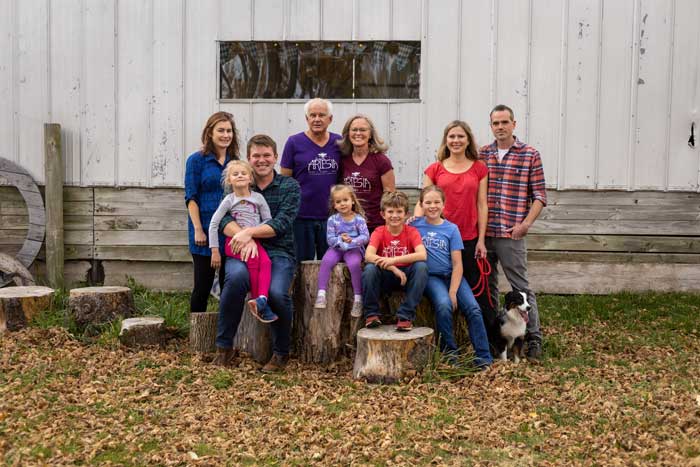
Katrina followed in her mother’s footsteps in educational studies as well as flute, while Evan focused on oboe performance with a minor in English. Alison went to the University of Illinois.
Morris and Linda were thrilled with all of their kids’ choices, but, with Katrina and Evan at IWU, they could relive everything that had changed and stayed the same since their own undergraduate years.
“It took me forever to get an A on a paper from Professor (Pamela) Muirhead, so I told Evan that it would be hard to get one when he took a class with her. Then he gets an A on his first paper. I was so mad.” Linda said. Meanwhile Katrina lived on the same floor of the same dorm, Gulick Hall, that Linda had lived in for four years.
Katrina and Evan also were able to revisit their own experiences as children of alumni. One of Evan’s earliest childhood memories is of chewing on the sleeves of his mom’s IWU sweatshirt, and, although Evan was too little to remember, Linda recalls the time he was frightened out of the theater by an IWU performance of Jack and the Beanstalk while Katrina and Alison stayed to watch. But it wasn’t all about early childhood for them.
“Katrina and I both had a lot of respect for Steve Eggelston,” Illinois Wesleyan’s long-time professor of music, Evan said, and the instruction he received as a music student “made grad school seem easy.” But what they both heard from their parents many times was how the humanities had prepared them for life, and that’s the most valuable education they could receive from IWU.
· · ·
“Idyllic” is the word all of the Tammens use to describe their life on the farm.
“It was quiet,” Evan said, “It’s an easy place to think.”
“There were endless opportunities for adventure outside,” Katrina remembered.
They were a close family with dogs, cats, pigs, goats, a new house to replace the one Morris’s parents had bought (and that was demolished with “The Lark Ascending” playing from one of Morris’s records as a bittersweet dirge) and a wide range for the kids to run around. But, as dear as the land is to the family, Morris and Linda were ready to retire, and the kids had other plans for their careers. The Tammens’ time farming the land would have to end.
As most farmers find when they retire in such a way, selling their equipment leads to an influx of cash that needs to be reinvested. There were all kinds of options to consider, but they had already spent eight years imagining a brewery.
Evan had taken up small-batch craft brewing as a hobby along with Katrina’s husband, Ryan Reber, and they had gotten pretty good at it.
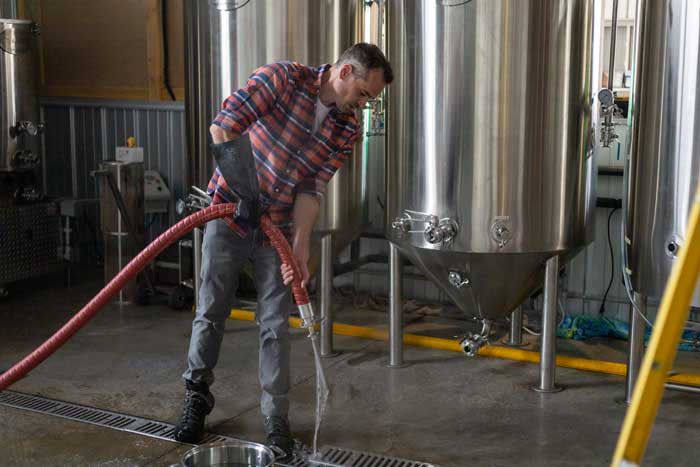
“It’s kind of like how every parent thinks their kid is beautiful. Every brewer thinks their beer is something special, but we were confident.” Evan said. And, even if they were biased as well, Morris and Linda thought that Evan and Ryan were making drinks that were better than anything they could get from the store.
They weren’t sure they were ready to graduate from a home operation to a full-scale craft brewery, at least not before they retired themselves, but the Tammen parents had an entire warehouse and fleet of farm equipment that needed to be turned into something new, and a professional brewing business fit the bill, whether they were ready or not.
“It was jump-starting our dream,” Katrina said.
So the Tammens started making plans to found Artesia Brewing in 2021, named after the well emerging from the center of the property. They turned the pig pen into an outdoor seating and performance venue with live music every weekend, remade a large shed (that still has one of Morris’s childhood arrows lodged among the rafters) into an event space, planted an apple orchard, constructed a stack of beehives and built an indoor tasting room in one half of the warehouse to seat about 50 guests.
Filling the other half is a row of fermentation tanks brewing a tap full of original beverages — strawberry cereal beer, German lager, smoked rauchbier and mead brewed with their own honey, among others — named with the occasional sly reference to the family’s experience at Illinois Wesleyan. Most notably their original signature brew, the Streaker.
It’s an endeavor to which the entire family contributes. Construction, remodeling, brewing, serving and even marketing have all been accomplished by Morris and Linda, their three children and their children-in-law. And they have all taken to it as naturals, even as it was one of the most difficult professional challenges they had faced.
“I told them that we needed to plan on dumping the first three or four batches down the drain, but we didn’t,” Linda said.
“I tasted the Streaker for the first time, and it was good, and I cried.” Katrina said.
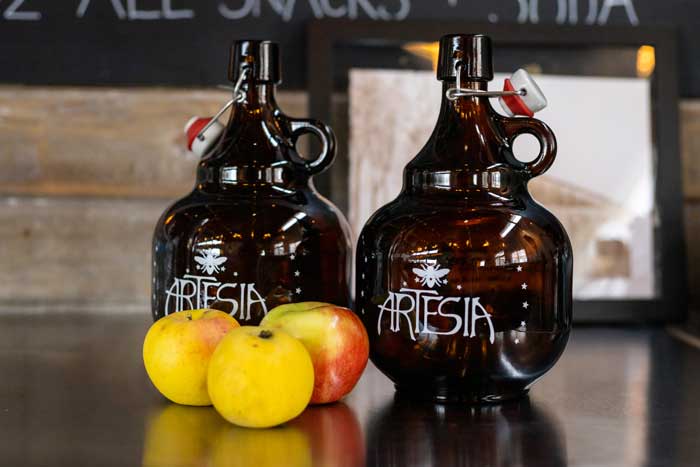
Every weekend their tasting room fills with visitors who get to hear the stories behind the beers while Morris’s devil mask watches over the bar.
“A patron once told me that he travels to visit breweries, and ours is the only one he’s been to where he liked everything on tap.” Linda said.
Morris and Linda are proud and happy for what they have all accomplished together in the understated way that life on a Midwest farm will engender in people. And it helps that they never expected anything from their family aside from pursuing their dreams and being happy together.
With two generations of IWU graduates and a new business bringing the kids and grandchildren back to the farm, Artesia Brewing has already become a success that reinvents the Tammen family land for a new generation — a generation that might end up back at IWU too.